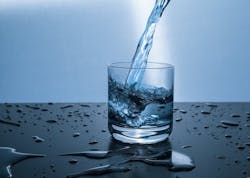Senate Passes Drinking Water & Wastewater Infrastructure Act of 2021
On Apr. 29, the U.S. Senate passed the Drinking Water and Wastewater Infrastructure Act of 2021 for wastewater, storm water, drinking water and water reuse infrastructure.
The bill authorizes more than $35 billion for water resource development projects across the country.
The Senate passed the bill by a vote of 89 - 2, reported Water Environment Federation (WEF).
The bill would reauthorize and significantly increase the amount of federal assistance made available to states and communities through the Drinking Water State Revolving Fund (DWSRF) and the Clean Water State Revolving Fund (CWSRF) programs.
The DWSRF would start its reauthorization at $2.4 billion in 2022 and gradually increase annually to $3.25 billion for fiscal years 2025 and 2026. The CWSRF would follow the same reauthorization pattern for funding annually, amounting to $14.7 billion for both programs.
After the bills pass both the House and Senate, the goal will be to negotiate a final agreement by early summer 2021.
Once passed by Congress, the water infrastructure package will be eligible to be included in the expected major infrastructure package later this year, reported WEF.
According to the bill, reported WEF, some of the reauthorizations and changes include:
- The Clean Water State Revolving Fund (SRF) would get $14.65 billion over the next five years;
- The Water Infrastructure Finance and Innovation Act would get $250 million over the next five years and require one ratings agency opinion letter instead of two;
- The U.S. EPA Sewer Overflow & Stormwater Reuse Municipal Grant Program would get $1.4 billion over the next five years;
- And the Alternative Source Water Pilot Program would get $125 million over the next five years.
The bill also includes a drinking water section, which reauthorizes a drinking water resilience grant program, lead service line and lead in schools grants, per- and polyfluoroalkyl substances (PFAS) treatment grants, and other drinking water sustainability grant programs, according to WEF.
According to WEF, the bill also lays out details for several programs that WEF has been advocating for, including:
- The Rural and Low-Income Water Assistance Pilot Program, which would establish a new EPA program to provide 40 grants per year to utilities to assist low-income ratepayers;
- The Wastewater Energy Efficiency Grant Pilot Program, which would get $100 million over the next five years.
- The Stormwater Infrastructure Technology Program, which would get $25 million to create five Stormwater Centers of Excellence and $50 million for storm water infrastructure planning/development and implementation grants;
- The Clean Water Infrastructure Resiliency and Sustainability Grant Program, which would get $125 million over the next five years;
- And the Water Infrastructure and Workforce Investment Grant Program, which would get $25 million over the next five years.
After the bills pass both House and Senate, they will then be negotiated with the goal of a final agreement by early summer. Once passed by Congress, the water infrastructure package will be eligible to be included in the expected major infrastructure package later this year.
